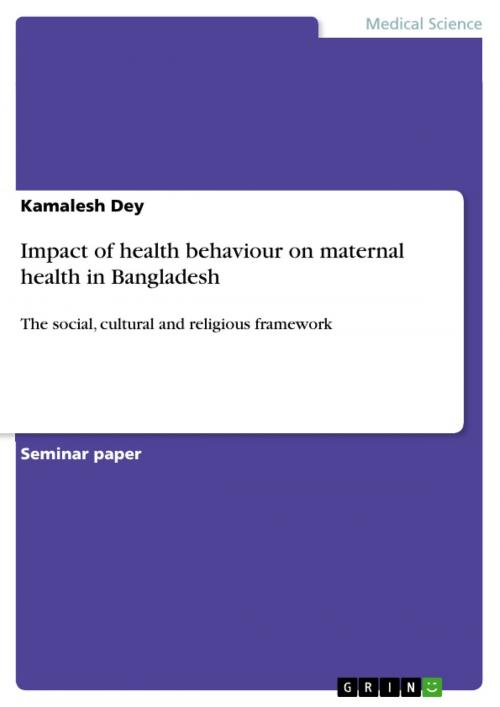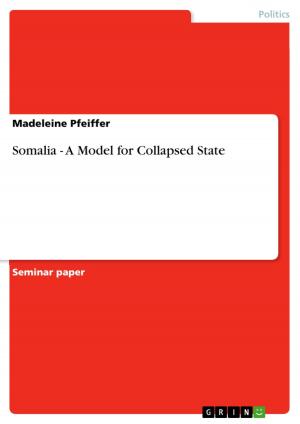Impact of health behaviour on maternal health in Bangladesh
The social, cultural and religious framework
Nonfiction, Health & Well Being, Medical, Reference, Public Health| Author: | Kamalesh Dey | ISBN: | 9783668237544 |
| Publisher: | GRIN Publishing | Publication: | June 9, 2016 |
| Imprint: | GRIN Publishing | Language: | English |
| Author: | Kamalesh Dey |
| ISBN: | 9783668237544 |
| Publisher: | GRIN Publishing |
| Publication: | June 9, 2016 |
| Imprint: | GRIN Publishing |
| Language: | English |
Seminar paper from the year 2015 in the subject Medicine - Public Health, University of Bedfordshire, course: MSc in Public Health, language: English, abstract: The essay will talk about maternal health and health behaviour in Bangladesh. It will also critically explore the actual fact in Bangladesh, how maternal health is influenced by their health behaviour based on social, cultural and religious framework. Moreover, it will also highlight governmental strategy for improving maternal health which will be an outstanding achievement of the 'Millennium Development Goal (MDG) 5' in Bangladesh. Maternal health is the prime concern of public health in Bangladesh. After that, Bangladesh is highly motivated to achieve its 'Millennium Development Goal (MDG) 5' for improving maternal health and reducing the maternal mortality rate by 75% between the period of 1990 and 2015. Bangladesh's government is promoting a safe maternity practice and reducing maternal mortality. Already, the government has been expanded and has promoted existing health services, implementing them with a new policy and services performing EOC (essential obstetric care), accessible to all women particularly pregnant mothers and adolescents. Moreover, Bangladesh is a highly populated developing country in the world with a maternal mortality ratio of 170/100,000 live births. Particularly, prenatal and postnatal care is very poor in Bangladesh because of malnutrition. It is stated that in Bangladesh the maternal mortality and morbidity rate is the second highest in the world. There are several influential factors, for instance: indigenous health behaviour and traditional lifestyle which are remarkably based on social, cultural and religious belief. In Bangladesh, around 20,000 mothers are dying each year during their pregnancy, while 69% are from obstetric causes, 14% are as a result of injury and violence and the rest due to indirect deaths.
Kamalesh Dey PhD student at Institute for Sport and Physical Activity Research (ISPAR), University of Bedfordshire. BSc in Food technology and Nutritional Science MSc in Public Health MBA (Health Services Management), United Kingdom. kamalesh_07007@yahoo.com / kamalesh.dey@study.beds.ac.uk +447574748607
Seminar paper from the year 2015 in the subject Medicine - Public Health, University of Bedfordshire, course: MSc in Public Health, language: English, abstract: The essay will talk about maternal health and health behaviour in Bangladesh. It will also critically explore the actual fact in Bangladesh, how maternal health is influenced by their health behaviour based on social, cultural and religious framework. Moreover, it will also highlight governmental strategy for improving maternal health which will be an outstanding achievement of the 'Millennium Development Goal (MDG) 5' in Bangladesh. Maternal health is the prime concern of public health in Bangladesh. After that, Bangladesh is highly motivated to achieve its 'Millennium Development Goal (MDG) 5' for improving maternal health and reducing the maternal mortality rate by 75% between the period of 1990 and 2015. Bangladesh's government is promoting a safe maternity practice and reducing maternal mortality. Already, the government has been expanded and has promoted existing health services, implementing them with a new policy and services performing EOC (essential obstetric care), accessible to all women particularly pregnant mothers and adolescents. Moreover, Bangladesh is a highly populated developing country in the world with a maternal mortality ratio of 170/100,000 live births. Particularly, prenatal and postnatal care is very poor in Bangladesh because of malnutrition. It is stated that in Bangladesh the maternal mortality and morbidity rate is the second highest in the world. There are several influential factors, for instance: indigenous health behaviour and traditional lifestyle which are remarkably based on social, cultural and religious belief. In Bangladesh, around 20,000 mothers are dying each year during their pregnancy, while 69% are from obstetric causes, 14% are as a result of injury and violence and the rest due to indirect deaths.
Kamalesh Dey PhD student at Institute for Sport and Physical Activity Research (ISPAR), University of Bedfordshire. BSc in Food technology and Nutritional Science MSc in Public Health MBA (Health Services Management), United Kingdom. kamalesh_07007@yahoo.com / kamalesh.dey@study.beds.ac.uk +447574748607















